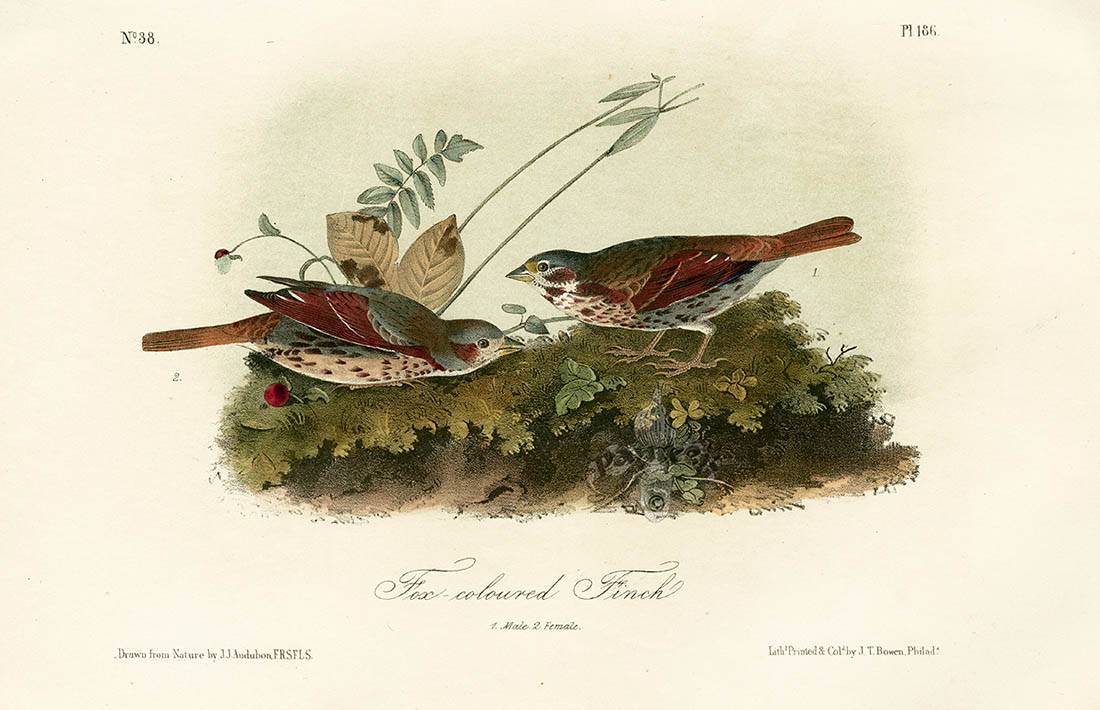John James Audubon (1785-1851)
was born in the French colony of Santa Domingo (later known as Haiti) to a wealthy French sea captain
& merchant and a young slave, Jeanne Rabin, who died
six months after his birth. Early on, Audubon became
passionately interested in nature, avoiding whenever
possible the rigors of the French educational system
by wandering in the countryside sketching &
collecting.
He was sent by his father to
his plantation Mill Grove in Pennsylvania possibly
to avoid conscription into Napoleonís army. There
he pursued his love of nature and collecting in a
bountiful environment, to the detriment of the
business of running his fatherís plantation.
His marriage in 1808 to Lucy Blackwell, an
English woman and neighbor, added stability to his
life. For over ten years, the family lived in
Kentucky where Audubon was a frontier shopkeeper,
while continuing to pursue his avocation of
naturalist & artist. While there, Lucy gave birth
to two sons, Victor Gifford and John Woodhouse, as
well as a daughter who died in infancy. Audubon was
quite successful in business for a while, but hard
times hit, and in 1819 he was briefly jailed for
bankruptcy. In the absence of other opportunities,
Audubon launched on the life of backwoodsman,
naturalist & adventurer in the south, while Lucy
supported them by working as a governess. Lucy
survived both her husband and sons, selling off the
copper plates for The Birds of America late on in
life for their value as
scrap metal. Fortunately, many were rescued.
Audubon worked on the monumental Birds of America
from 1827-1838, illustrating & editing one of the
largest & most expensive bird books in the world.
He used the finest of specimens, and all types of
media including oil crayon, pastel watercolors, ink
& gouache to stunning effect. His genius was
in his intimate knowledge of the world of birds &
their surroundings gained from a lifetime of
observation in the field, and the ability to
translate this vision into a publication that has
never been equaled in the world of ornithology.
Audubon also applied his methodology and artistry
to create a record of the Native American mammals.
The Quadrupeds of North America, which
became an immediate success on publication,
illustrated many frontier mammals never before seen
or depicted. A mainstay of this work of Audubonís
later years was John Bachman (1790-1874), a Lutheran
minister & naturalist from Charleston and a renowned
authority on American quadrupeds. Bachmanís
daughters, Maria & Eliza
later married Victor & John, Audubon's sons, uniting
the two families. Bachmanís initial hesitation
about the work was largely overcome by the agreement
that the proceeds of the publication would be for
the benefit of Victor, John, and their families.
Bachman was a pivotal influence in the completed
work, writing most of the text & editing the entire
work.
Sadly, Audubon died before the publication of the
quarto edition of the Quadrupeds which
was completed by his son, John Woodhouse Audubon.
The legacy of Audubon to the world was in these two
superb works on American Birds & Quadrupeds which
have come to signify a love of all wild creatures &
the environment, epitomized today by the Audubon
Society, & immortalized world wide in publications
and the stamps of over 60 countries. In the words
of the Audubon Society, perhaps above all
else, Audubon was a lover and observer of birds and
nature.
References include Dictionary of Bird
artistsp.141, Great Bird Books p. 73 & the Audubon
website, at www.Audubon.org
We are pleased to offer hand colored prints from
the last edition of the most accessible of all the
Audubon works, the quarto Birds of America,
published by George R. Lockwood in 1871. This
edition was produced by the firm which took over the
lithographic stones from the
Audubons following their bankruptcy. It
is the rarest of the quarto editions as the plates
were destroyed in a fire.
The later editions differ from the first quarto
edition in that there are added color printed
backgrounds on some. The birds and foliage remain hand
colored as in the first edition. The prints are in
wonderful condition on heavy wove paper with no
foxing and vibrant hand coloring. They
represent a great bargain for original Audubon
prints. Each print
measures approximately 101/4 inches by 6 1/2 inches,
with binding edge preserved intact. The text pages
are included and when overlapped, have been
carefully copied. It is a great pleasure for
us to present this work almost in its entirety with
a wonderful array of the top plates at a fraction of
the cost of the first edition.
We accept credit cards, PayPal, checks, and money
orders. Washington state residents pay Washington state sales tax. Shipping for this item is
$8.95. Items can be combined to save on postage.
Our environment is smoke free. We pack professionally using only new materials. All items are beautifully wrapped and suitable for sending directly as
gifts. You may return any item within 7 days if not satisfied.
To order, you may call us at 1-888-PANTEEK, fax or
email.

